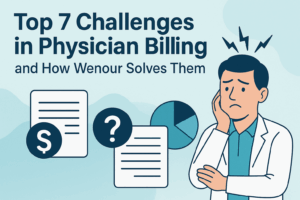In recent years, AI tech has gained popularity as a solution to combat care team burnout and cut operational costs — improvements made more necessary by the financial and mental stress caused by Covid-19.
For many, the future of revenue cycle management (RCM) in the age of artificial intelligence (AI) is difficult to imagine. How can this technology improve the revenue cycle and impact the day-to-day working of the back-office in healthcare? Of course, at this point, nobody knows precisely when AI will be the industry standard, but there is some buzz around possible benefits AI may soon offer.
How is artificial intelligence used in healthcare?
Artificial Intelligence-assisted Robotic Surgery: Using data from medical records to help surgeons through out the surgery.
Nurse-Like Chatbots: Answering basic queries using natural language interpretation, processing requests, and informing the relevant staff person to address patient problems.
Generating Diagnosis with Ai: The process of analyzing symptoms and generating objective diagnostic possibilities for medical experts.
Automated Medical Coding and Billing: Ai may automatically review medical records and help in automated medical coding and billing.
KEY TAKEAWAYS
AI Will Simplify Workflows for Medical Billing, Deep learning of the users’ interaction with Electronic Health Record (HER) and billing applications may have the most critical effect on a medical biller’s everyday life. For virtually all of the significant health IT vendors, using AI to Understand a customer’s behaviors, predict their expectations, and show the correct data at the right time is a top priority. The ability to retrieve and manipulate information instantly has the power to significantly minimize labor spent on manual billing activities and allow workers to make smarter choices about the next steps to overcome denials.
Enhanced Medical Coding Precision, Its capacity to analyze text and the spoken word would be a core feature of AI. For procedures and diagnosis, systems can learn the language and assign specific codes. After code set updates, this functionality will have a profound effect to ensure the correct codes are used and paperwork is compliant, reducing the change that arises with updates to coding. If AI had been included, think how much simpler the transition from ICD-9 (International Classification of Diseases, Ninth Revision) to ICD-10 (Tenth Revision) would have been.
Immediate Pre-Authorizations, Its capacity to draw assumptions and forecasts will be one of the most critical facets of AI. It can take hours now, or even days, to get a payer’s pre-authorization. Future systems will interpret clinical data from a patient and assess the medical need of treatment within a few seconds. The good news for medical billers is that an automated mechanism will verify that authorization has been received and its related data collected, significantly minimizing (or eliminating) pre-authorization denials due to the absence of an authorization number.
Artificial intelligence can help optimize backend systems, Administrative workflows, such as filing claims or medical coding, are one of the leading costs for healthcare systems and causes of burnout. AI can help automate and optimize these workstreams.
Recent advancements in NLP are streamlining the billing and insurance cycle, Significant progress in interpreting medical documentation has been made with language models from Google and OpenAI. Healthcare-focused open-source NLP tools have also been released for developers such as Amazon Comprehend Medical and Google’s Healthcare Natural Language API.
AI solutions in administrative automation will largely depend on electronic health record (EHR) data, Medical coding solutions use EHR notes to translate health services into billing codes, and AI-powered RPA platforms can extract data from EHRs to populate claims forms.
AI designed to support the expertise of a medical coder
With the exponential growth of healthcare data and complexity expected to continue, the expertise of medical coders remains in high demand. The US Bureau of Labor Statistics projects 8% growth for the profession between 2019 and 2029, which is faster than the estimated growth rate for other professions.
AI can support the work of medical coders. Not only can this relieve medical coding fatigue and help improve efficiency and accuracy, but it has the potential to enable medical coders to focus on more meaningful work – such as spotting trends of unusual numbers of adverse effects being reported. AI can help reduce manual tasks in medical coding workflows and enable teams to apply those resources where most needed.







